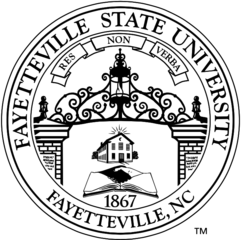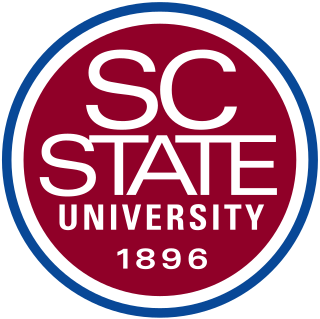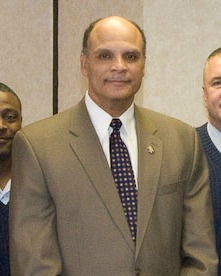
Cheyney University of Pennsylvania is a public historically black university in Cheyney, Pennsylvania. Founded in 1837 as the Institute for Colored Youth, it is the oldest of all historically black colleges and universities (HBCUs) in the United States. It is a member of the Pennsylvania State System of Higher Education and the Thurgood Marshall College Fund. The university offers bachelor's degrees and is accredited by the Middle States Commission on Higher Education.

Appalachian State University is a public university in Boone, North Carolina. It was founded as a teachers' college in 1899 by brothers B. B. and D. D. Dougherty and the latter's wife, Lillie Shull Dougherty. The university expanded to include other programs in 1967 and joined the University of North Carolina System in 1971.

Tennessee State University is a public historically black land-grant university in Nashville, Tennessee, United States. Founded in 1912, it is the only state-funded historically black university in Tennessee. It is a member-school of the Thurgood Marshall College Fund. Tennessee State University offers 41 bachelor's degrees, 23 master's degrees, and eight doctoral degrees. It is classified as "R2: Doctoral Universities – High research activity".
Historically black colleges and universities (HBCUs) are institutions of higher education in the United States that were established before the Civil Rights Act of 1964 with the intention of primarily serving African Americans. Most of these institutions were founded during the Reconstruction era after the Civil War and are concentrated in the Southern United States. They were primarily founded by Protestant religious groups, until the Second Morill Act of 1890 required educationally segregated states to provide African American, public higher-education schools in order to receive the Act's benefits.

Delaware State University is a privately governed, state-assisted historically black land-grant research university in Dover, Delaware. DSU also has two satellite campuses: one in Wilmington and one in Georgetown. The university encompasses four colleges and a diverse population of undergraduate and advanced-degree students. Delaware State University is classified among "R2: Doctoral Universities – High research activity".

Fayetteville State University (FSU) is a public historically black university in Fayetteville, North Carolina, United States. It is part of the University of North Carolina System and the Thurgood Marshall College Fund.

Texas Southern University is a public historically black university in Houston, Texas. The university is a member school of the Thurgood Marshall College Fund and is accredited by the Southern Association of Colleges and Schools. It is classified among "R2: Doctoral Universities – High research activity".

South Carolina State University is a public, historically black, land-grant university in Orangeburg, South Carolina. It is the only public, historically black land-grant institution in South Carolina, is a member-school of the Thurgood Marshall College Fund, and is accredited by the Southern Association of Colleges and Schools (SACS).

Grambling State University is a public historically black university in Grambling, Louisiana. Grambling State is home of the Eddie G. Robinson Museum and is listed on the Louisiana African American Heritage Trail. Grambling State is a member-school of the University of Louisiana System and Thurgood Marshall College Fund.

The NAACP Legal Defense and Educational Fund, Inc. is an American civil rights organization and law firm based in New York City.

Coppin State University (Coppin) is a public historically black university in Baltimore, Maryland, United States. It is part of the University System of Maryland and a member of the Thurgood Marshall College Fund.

Frederick Douglass Patterson was an American academic administrator, the president of what is now Tuskegee University (1935–1953), and founder of the United Negro College Fund. He was a 1987 recipient of the Presidential Medal of Freedom, the nation's highest civilian honor, and 1988 recipient of the Spingarn Medal from the NAACP.
Joshua Isaac Smith is an American businessman and former chairperson of the Commission on Minority Business Development.
The Thurgood Marshall College Fund (TMCF) is an American non-profit organization that supports and represents nearly 300,000 students attending its 47 member-schools that include public historically black colleges and universities (HBCUs), medical schools, and law schools. The organization is named after the Supreme Court's first African-American Justice, Thurgood Marshall.

Jim Clifton is the chairman of Gallup, a global analytics and advice firm. Clifton served as the CEO of Gallup from 1988 until 2022, and is the author of the #1 Wall Street Journal bestseller It's the Manager, the bestseller Born to Build, The Coming Jobs War, and writes The Chairman's Blog. He is the creator of the behavioral economic framework, “The Gallup Microeconomic Path,” a metric-based economic model that establishes the linkages among human nature in the workplace, customer engagement and business outcomes, which is used by over 500 companies worldwide. His father was psychologist, educator, and author Dr. Donald O. Clifton, who founded of Selection Research, Inc. (SRI). Under Jim's leadership, SRI acquired the Gallup Organization in 1988.

Harold L. Martin Sr. is an American engineer and educator who is Chancelor Emeritus of North Carolina Agricultural and Technical State University and former chancellor of Winston-Salem State University.

A. Zachary Faison Jr. is an American academic administrator and attorney. In 2018, he became the 30th President and CEO of Edward Waters University in Jacksonville, Florida. Faison previously served at Tuskegee University as General Counsel and Vice President of External Affairs.
Romeo Marcus Williams was an American civil rights attorney who organized large-scale student protests against segregation in Marshall, Texas. He was also a junior partner of Dallas, Texas civil rights attorney, William J. Durham, who served as lead counsel on two landmark U.S. Supreme Court cases, Sweatt v. Painter, and Smith v. Allwright.
Wilma Ann Mishoe is an American academic administrator who served as the eleventh president of Delaware State University from 2018 to 2019. She was the interim president of Wilberforce University in 2014.














